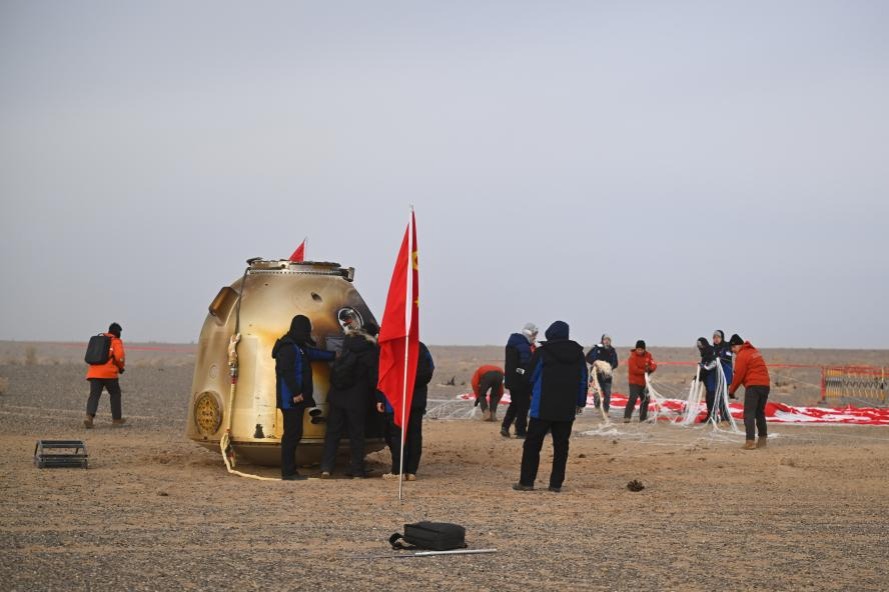Collective study gets a renewed emphasis

The collective study of the CPC Central Committee Political Bureau, a Party tradition, has gained new momentum in the past five years.
Observers said they have seen the Party's aspiration to improve itself through frequent studies and new factors in class, as well as to understand the focus of the Communist Party of China by analyzing its code-themes of the massive studies.
Since the 18th CPC National Congress in 2012, the Political Bureau has held 43 collective studies, once per month on average, focusing on various subjects.
Among them, 13 studies focused on political construction, nine on the economy, seven on military, defense and diplomatic affairs, five on Party building, four on social construction, three on cultural construction and two on ecological civilization.
"The studies covered almost every part of China's modernization efforts. From the distribution of the themes, we can tell the focus of the Party's job and thoughts," said Xu Yaotong, a professor of political science studies at the Chinese Academy of Governance.
The mechanism of the Political Bureau collective study was initiated in December 2002 and has been fully developed since the 18th CPC National Congress.
Li Ran, a professor of the School of Marxism of Fudan University in Shanghai, noted that the CPC is a learning Party. "Apparently, themes of studies are important issues in governance and the fields in which Party cadres, especially high-ranking ones, should improve their capabilities."
An analysis carried by the overseas edition of People's Daily in May said that since the 18th CPC National Congress there have been three collective studies on the rule of law and another three on Marxism-two of the most popular themes.
"It is not difficult to tell that... rule of law and Marxism have important roles in governance," the analysis said.
Gao Fei, assistant president of China Foreign Affairs University, noted that there were two studies on global governance. One was held in September 2016 and themed on the G20 Summit and transformation of the global governance system, while the other was in October 2015 and themed on the global governance structure and system. The lectures were by Gao and Qin Yaqing, president of the university.
"That two collective studies on global governance were held within one year reflects the long-term view of the leadership. Against the background of anti-globalization, all countries are facing severe domestic and international challenges," Gao said.
"The CPC Central Committee seized the keyword of 'governance' to domestically deepen reform and improve governance, while externally actively attending to global governance and leading transformation of the international system," he said. "Before the arrival of the storm, China was fully prepared."
This year, there have been six studies, themed on supply-side structural reform; accurate poverty alleviation; national financing security; green development and life; military reform; and modern Marxism thoughts.
"The last study is very important. I view it as theoretical and thought preparation for the 19th CPC National Congress," said Xu, from the Chinese Academy of Governance.
Aside from new topics, another change in studies since 2012 was that many high-ranking officials became lecturers, including ministers, governors and high-level officials.
For example, at the study themed on protecting national financing security on April 25, lecturers included three ministerial-level officials, including the heads of the People's Bank of China, the China Banking Regulatory Commission and the China Securities Regulatory Commission. The China Insurance Regulatory Commission sent a vice-chairman as lecturer.
"In the past, most lecturers of Political Bureau collective studies were professors and experts. But such studies are not theoretical, and they should also cover experience earned in practice. That would make the studies more enlightening," said Xu Yaotong.
Xu said the CPC's mechanism for improving its political wisdom and capabilities through collective learning is unique among other countries of the world. "It is a creative measure."
Xi Jinping, general secretary of the CPC Central Committee, once said the Party has made today's achievements through learning, and it will certainly move toward the future through learning.
The CPC has stressed learning since its early years.
From 1938 to 1942, the CPC Central Committee, which was based in Yan'an, Shaanxi province, at that time, launched a massive cadre education movement.
Scholars believe the move greatly improved capabilities of the Party, contributed to the victory in the War of Resistance Against Japanese Aggression (1931-45) and the War of Liberation (1946-49) and consolidated its governance capabilities.
Yang Yongchun, deputy head of the China Against Corruption Law Association, said the Political Bureau collective study mechanism is "an important part in China's governance mechanism".
The Political Bureau members not only update their knowledge but can also reach new consensus on some issues, Yang said.
- Chinese scientists achieve breakthrough in precise protein degradation
- Chinese researchers develop blink-powered eye-tracking device to help paralyzed patients control wheelchairs
- China's commercial crewed spacecraft test capsule completes land-buffering verification
- China's job market stable in 2025 with 5.2% surveyed urban unemployment rate
- Kyz Kuu (Kazakh equestrian)
- Atlas Silk




































